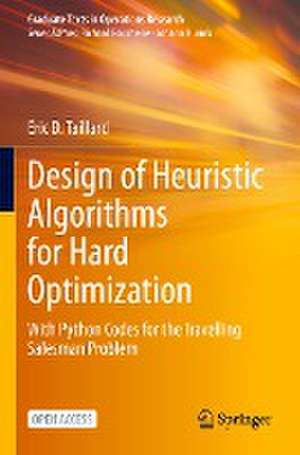Design of Heuristic Algorithms for Hard Optimization: With Python Codes for the Travelling Salesman Problem: Graduate Texts in Operations Research
Autor Éric D. Taillarden Limba Engleză Paperback – 31 oct 2023
The book approaches the main metaheuristics from a new angle, deconstructing them into a few key concepts presented in separate chapters: construction, improvement, decomposition, randomization and learning methods. Each metaheuristic can then be presented in simplified form as a combination of these concepts. This approach avoids giving the impression that metaheuristics is a non-formal discipline, a kind of cloud sculpture. Moreover, it provides concrete applications of the travelling salesman problem, whichillustrate in just a few lines of code how to design a new heuristic and remove all ambiguities left by a general framework. Two chapters reviewing the basics of combinatorial optimization and complexity theory make the book self-contained. As such, even readers with a very limited background in the field will be able to follow all the content.
| Toate formatele și edițiile | Preț | Express |
|---|---|---|
| Paperback (1) | 355.31 lei 6-8 săpt. | |
| Springer International Publishing – 31 oct 2023 | 355.31 lei 6-8 săpt. | |
| Hardback (1) | 361.28 lei 3-5 săpt. | +31.73 lei 7-13 zile |
| Springer International Publishing – 30 oct 2022 | 361.28 lei 3-5 săpt. | +31.73 lei 7-13 zile |
Preț: 355.31 lei
Nou
Puncte Express: 533
Preț estimativ în valută:
67.99€ • 74.08$ • 57.29£
67.99€ • 74.08$ • 57.29£
Carte tipărită la comandă
Livrare economică 23 aprilie-07 mai
Preluare comenzi: 021 569.72.76
Specificații
ISBN-13: 9783031137167
ISBN-10: 3031137167
Pagini: 287
Ilustrații: XV, 287 p. 1 illus.
Dimensiuni: 155 x 235 mm
Greutate: 0.43 kg
Ediția:1st ed. 2023
Editura: Springer International Publishing
Colecția Springer
Seria Graduate Texts in Operations Research
Locul publicării:Cham, Switzerland
ISBN-10: 3031137167
Pagini: 287
Ilustrații: XV, 287 p. 1 illus.
Dimensiuni: 155 x 235 mm
Greutate: 0.43 kg
Ediția:1st ed. 2023
Editura: Springer International Publishing
Colecția Springer
Seria Graduate Texts in Operations Research
Locul publicării:Cham, Switzerland
Cuprins
Part I: Combinatorial Optimization, Complexity Theory and Problem Modelling.- 1. Elements of Graphs and Complexity Theory.- 2. A Short List of Combinatorial Optimization Problems.- 3. Problem Modelling.- Part II: Basic Heuristic Techniques.- 4. Constructive Methods.- 5. Local Search.- 6. Decomposition Methods.- Part III: Popular Metaheuristics.- 7. Randomized Methods.- 8. Construction Learning.- 9. Local Search Learning.- 10. Population Management.- 11. Heuristics Design.- 12. Codes.
Notă biografică
Éric D. Taillard is a professor at the University of Applied Sciences and Arts of Western Switzerland, HEIG-VD campus in Yverdon-les-Bains. After completing his studies and obtaining a PhD at the Swiss Federal Institute of Technology in Lausanne, he worked as a researcher at the Interuniversity Research Centre on Enterprise Networks, Logistics and Transportation in Montreal, Canada, and then at the Dalle Molle Institute for Artificial Intelligence in Lugano, Switzerland.
He has over 30 years of research experience in the field of metaheuristics. Outside of Switzerland, he has been invited to teach this subject at various universities: Vienna and Graz in Austria, Nantes in France and Hamburg in Germany.
He has over 30 years of research experience in the field of metaheuristics. Outside of Switzerland, he has been invited to teach this subject at various universities: Vienna and Graz in Austria, Nantes in France and Hamburg in Germany.
Textul de pe ultima copertă
This open access book demonstrates all the steps required to design heuristic algorithms for difficult optimization. The classic problem of the travelling salesman is used as a common thread to illustrate all the techniques discussed. This problem is ideal for introducing readers to the subject because it is very intuitive and its solutions can be graphically represented. The book features a wealth of illustrations that allow the concepts to be understood at a glance.
The book approaches the main metaheuristics from a new angle, deconstructing them into a few key concepts presented in separate chapters: construction, improvement, decomposition, randomization and learning methods. Each metaheuristic can then be presented in simplified form as a combination of these concepts. This approach avoids giving the impression that metaheuristics is a non-formal discipline, a kind of cloud sculpture. Moreover, it provides concrete applications of the travelling salesman problem, which illustrate in just a few lines of code how to design a new heuristic and remove all ambiguities left by a general framework. Two chapters reviewing the basics of combinatorial optimization and complexity theory make the book self-contained. As such, even readers with a very limited background in the field will be able to follow all the content.
The book approaches the main metaheuristics from a new angle, deconstructing them into a few key concepts presented in separate chapters: construction, improvement, decomposition, randomization and learning methods. Each metaheuristic can then be presented in simplified form as a combination of these concepts. This approach avoids giving the impression that metaheuristics is a non-formal discipline, a kind of cloud sculpture. Moreover, it provides concrete applications of the travelling salesman problem, which illustrate in just a few lines of code how to design a new heuristic and remove all ambiguities left by a general framework. Two chapters reviewing the basics of combinatorial optimization and complexity theory make the book self-contained. As such, even readers with a very limited background in the field will be able to follow all the content.
Caracteristici
This book is open access, which means that you have free and unlimited access Offers step-by-step procedures for the design of heuristic algorithms Contains numerous short illustrative codes for the travelling salesman problem Covers the main metaheuristics in a simple but rigorous way



